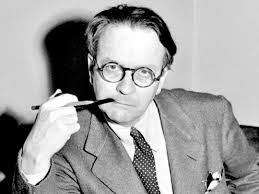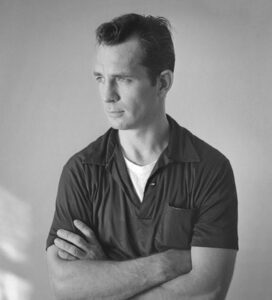by James Scott Bell
@jamesscottbell
We have today another first page for critique. The author describes the work as “Spec Fic with Horror Elements.” Let’s have a look and talk on the other side.

Bankside warehouse (Wikimedia Commons)
Watch All Night
Joe shivered his way down the cobbled alley lined with old Bankside warehouses. The February sun barely touched the first of them, but a freezing gust blasted its way in from the Thames. Nasty long winter, this. All slashing winds and feeble light. Soon be inside, though.
He buried his hands deeper into the pockets of the jacket Dil had “lent” him. The one that happened to be in his size and not Dil’s… but at least he’d have only bought it second-hand for Joe. Once this Eldmill job started, he’d sneak some money back to Dil. Move out of the hostel. Save up for a course, something working with at-risk teens. Do everything right this time. No dealing. No recruiting runners. No prison.
That must be it, that next one coming up, tarpaulin lunging from the roof, whip-crackling. All the warehouses he’d passed had already been turned into something new. They kept their listed historic shapes, though, their brown brick and shaded glass. Outside the Eldmill, changing into a swanky apartment building, plastic-wrapped packages clustered. A rusty security gate lay on the pavement. A forklift idled nearby. Unseen construction workers banged and drilled.
He stepped past a mud-splashed bollard dug out of the ground to make room for hauling the packages into the building. Now he’d arrived at his new job.
Fancy new glass door, steel frame glittered from the safety of the manufacturer’s tape that still covered it. Across about forty feet of beautiful granite floor, a reception desk fronted in warm, yellow-beige marble welcomed you. Two blokes in hardhats and multi-pocketed work trousers crossed the floor, the taller man sputtering laughter across one of those eco-mugs, printed with smiling golden giraffes, at something his mate said.
Joe stepped back. The heel of his trainers smacked into the unearthed bollard.
‘I’m not going in there.’
JSB: Well, I am chuffed to bits (that means “pleased as punch” in England) about this offering from across the pond. Let’s have a butcher’s hook (Cockney for “a look”) in detail:
Joe shivered his way down the cobbled alley lined with old Bankside warehouses.
This is an action opening. It has a character in motion, not mere narrative description. The descriptive elements, including the weather, are woven in as we move along.
Note the vivid descriptor shivered. A lesser hand would have written, Joe walked down the cobbled alley. He was shivering.
Tip: Train yourself to take just a moment or two to consider alternatives to “plain vanilla” verbs. If nothing comes to you, write on and look later. I find the best time for this is when I edit my previous day’s work. It’s not a heavy edit and I don’t linger, but always pick up ways to make the writing stronger.
The February sun barely touched the first of them, but a freezing gust blasted its way in from the Thames. Nasty long winter, this. All slashing winds and feeble light. Soon be inside, though.
Excellent. We’ve got the time and place and weather. Evocative words: gust blasted, slashing winds, feeble light. And a hint of what’s going on. Joe is heading “inside” somewhere. I want to know where.
We’re also in deep POV. The narrative portions are how Joe would think about these things.
Tip: To get into deep 3d Person, try writing a scene in First Person, then switch it.
He buried his hands deeper into the pockets of the jacket Dil had “lent” him. The one that happened to be in his size and not Dil’s… but at least he’d have only bought it second-hand for Joe. Once this Eldmill job started, he’d sneak some money back to Dil. Move out of the hostel. Save up for a course, something working with at-risk teens. Do everything right this time. No dealing. No recruiting runners. No prison.
I love this paragraph. It has background info but it’s slipped in unobtrusively. Joe has “borrowed” (stolen?) a jacket from a character named Dil. Joe has an honest streak in him, wanting to get money back to Dil. We know he’s been staying in a hostel and wants to save up money so he can make something of his life, something good. Do everything right this time. He’d been a drug dealer. He’s been in prison.
We’re only in the second paragraph and know just a little about Joe, but we have a rooting interest now. We love characters who have known hard times but who aren’t playing the victim, characters who want to better themselves.
There’s also mystery about what the “Eldmill job” is. Good. A little mystery in the opening prompts us to read on.
That must be it, that next one coming up, tarpaulin lunging from the roof, whip-crackling.
Superb. A tarpaulin is not merely hanging from the roof, it’s lunging. And the sentence ends with the original and striking whip-crackling.
Tip: The power of a sentence can often be improved by moving the most vivid word to the end. Hemingway did this all the time, e.g., Villalta, his hand up at the crowd and the bull roaring blood, looking straight at Villalta and his legs caving.
The author does more of the same here:
Outside the Eldmill, changing into a swanky apartment building, plastic-wrapped packages clustered.
How much better this is than clustered, plastic-wrapped packages.
It may seem like a little thing, but an accumulation of little things adds up to a big thing indeed: a vivid reading experience, the kind that makes fans.
A rusty security gate lay on the pavement. A forklift idled nearby. Unseen construction workers banged and drilled.
Visual and audible details. I’m there. (Tip: Don’t overlook the underused sense of smell.)
He stepped past a mud-splashed bollard dug out of the ground to make room for hauling the packages into the building.
Not: a bollard covered with mud.
Fancy new glass door, steel frame glittered from the safety of the manufacturer’s tape that still covered it. Across about forty feet of beautiful granite floor, a reception desk fronted in warm, yellow-beige marble welcomed you.
The one cavil I have with this is welcomed you. That’s a slight break from Joe’s deep POV. Might I suggest instead: Across about forty feet of beautiful granite floor, a welcoming reception desk fronted in warm, yellow-beige marble.
Two blokes in hardhats and multi-pocketed work trousers crossed the floor
Blokes is exactly the word Joe would use.
the taller man sputtering laughter across one of those eco-mugs, printed with smiling golden giraffes, at something his mate said.
The man doesn’t just laugh, he sputters laughter, and not with any mug, but an eco-mug. And not just an eco-mug, but one with smiling golden giraffes. What a nice, original detail that is.
Joe stepped back. The heel of his trainers smacked into the unearthed bollard.
Not the heel of his shoes, but the more specific trainers. And it doesn’t hit, it smacks. The author is choosing vivid descriptors each time. The little things!
‘I’m not going in there.’
Thus ends the page. I don’t know what the author intended here. It seems as if Joe says this out loud. Or maybe it’s someone else who is identified in the next line. And I believe it’s a British thing to use the single quote marks. Like Brother Gilstrap, I’m not a fan of that mark, but then again I don’t want to be a stuffy Yank. If that’s how they do it over there, so be it. I mean, they like blood sausage, so there you go.
I’m also not a fan of characters speaking out loud only to themselves. In movies or on the page it usually seems false. Consider changing that to an interior thought.
At least, however, if it is Joe speaking, we want to know why he suddenly doesn’t want to go in. The page-turning mystery is planted. And that’s the main point of these first-page critiques. Do we want to turn the page? I certainly do.
In short, my British writer friend, Bob’s your uncle!
Chime in, TKZers. What do you think of today’s page?
 To me that always sounds like “Destroy your delight” or “Drown your puppies.” Yeesh! I mean, if something is your darling should your first instinct be to kill it? Sounds positively psychopathic.
To me that always sounds like “Destroy your delight” or “Drown your puppies.” Yeesh! I mean, if something is your darling should your first instinct be to kill it? Sounds positively psychopathic.





 A story is told of a writer reading some bad poetry to a friend in a cold apartment. The only heat was a dying fire. Finally, shivering, the friend cried out, “My dear sir, either put fire into your verses or your verses into the fire!”
A story is told of a writer reading some bad poetry to a friend in a cold apartment. The only heat was a dying fire. Finally, shivering, the friend cried out, “My dear sir, either put fire into your verses or your verses into the fire!” He was 44 years old, an alcoholic, and had just been fired from his job because of his drinking. The Depression was in full tilt. Married, with savings running low, he had to find a way to make a living.
He was 44 years old, an alcoholic, and had just been fired from his job because of his drinking. The Depression was in full tilt. Married, with savings running low, he had to find a way to make a living.
 Edmund Burke, the eighteenth century member of Parliament known for his rousing speeches, regarded every word in a sentence as “the feet upon which the sentence walks.” He said that to alter a word—exchange it for a shorter or longer one, or give it a different position—would change the whole course of the sentence.
Edmund Burke, the eighteenth century member of Parliament known for his rousing speeches, regarded every word in a sentence as “the feet upon which the sentence walks.” He said that to alter a word—exchange it for a shorter or longer one, or give it a different position—would change the whole course of the sentence. One of the more ubiquitous quotes about writing out there, almost always attributed to Hemingway, is: “There is nothing to writing. All you do is sit down at a typewriter and bleed.”
One of the more ubiquitous quotes about writing out there, almost always attributed to Hemingway, is: “There is nothing to writing. All you do is sit down at a typewriter and bleed.”